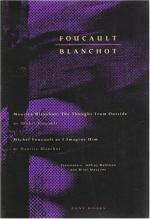|
This section contains 8,956 words (approx. 30 pages at 300 words per page) |

|
SOURCE: “Blanchot's Mother,”1 in Yale French Studies, No. 93, 1998, pp. 175-95.
In the following essay, Huffer examines the relationship between gender and nostalgia in the rhetorical strategies of The Space of Literature.
The death of the other restores men to each other.
—Nancy K. Miller, “The Exquisite Cadavers: Women in Eighteenth-Century Fiction”
I have to admit, the first time I read Maurice Blanchot’s The Space of Literature2 over a decade ago, there was much that I just didn’t get. Strangely, though, the book haunted me—not because I understood it, but because its pages were filled with the yearning of ghosts. Blanchot’s story of literary space responded to my own romantic sensibilities; and despite—or perhaps because of—its mysterious, elliptical language, I felt a shudder when I read it. Now, rereading Blanchot for the umpteenth time, I still shudder, but for different reasons. I haven...
|
This section contains 8,956 words (approx. 30 pages at 300 words per page) |

|


